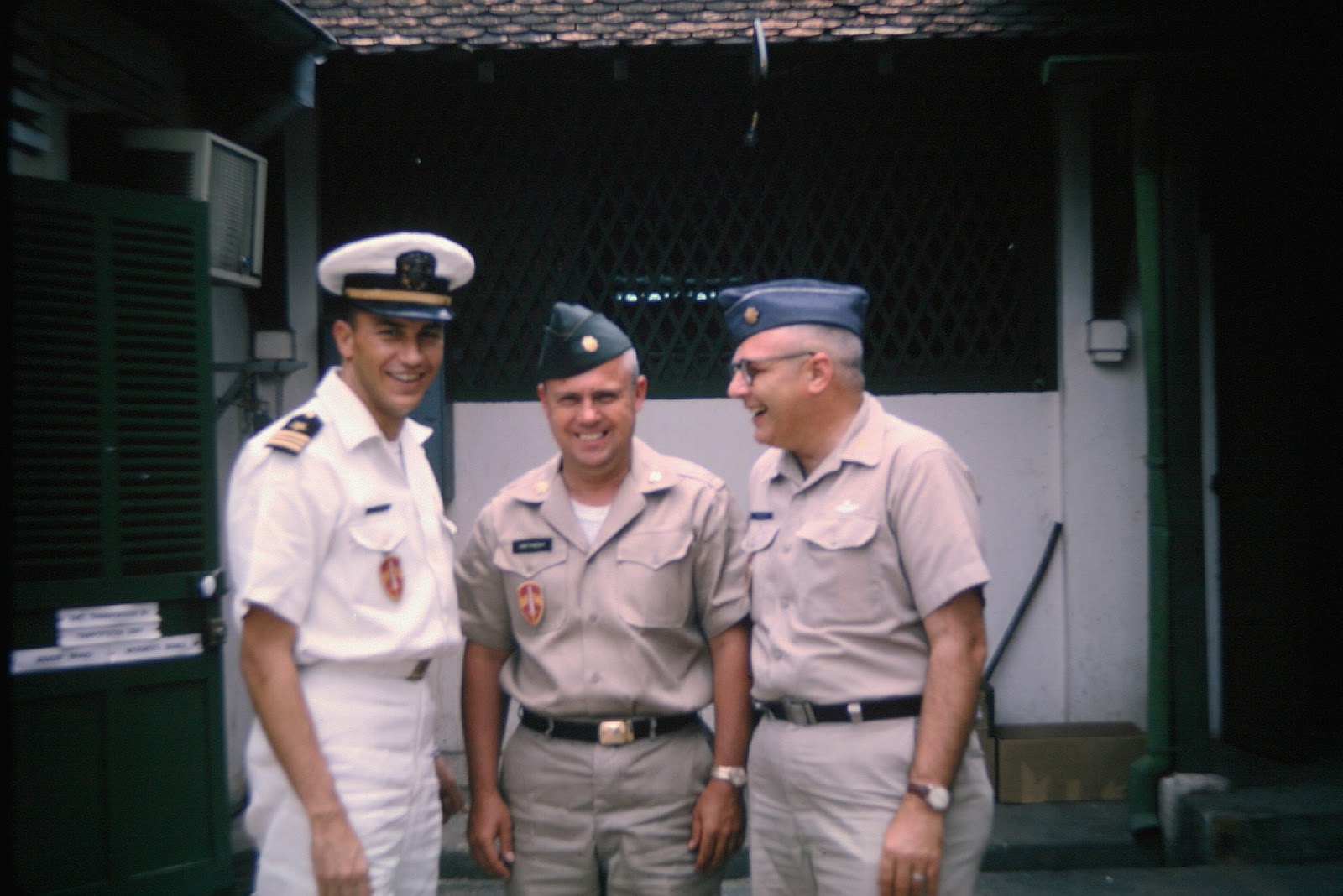Thursday Night, 22 July 1965
Did not write last night as we had a conference with a JCS study team here from Washington until 10:30 p.m. By the time I got back to the BOQ about 11, I was pooped out and went right to bed. Today has been a long one, too, but not quite as bad as yesterday. Got home at 8 p.m. and am going to fix some supper just as soon as I finish this.
The way things are happening so fast around here, it is hard to keep important events sorted out in my mind. I made one personnel change and have received one new officer in. I moved Lieutenant Commander Schaefer from the Sealift Center and put him to work in the main office. He has shown outstanding performance. Major [Orvil C. “Bud”] Metheny came in to work on Monday, and expect him to be a welcome addition to my main office.
Am sending him up to Da Nang tomorrow and Saturday to observe activities there. Lieutenant Commander [Dick] O’Neil is due in tomorrow, and expect to assign him also to main office to help take some burdens off me. A Major [Bob] Edwards came in this week but he was assigned to some other place, so I did not get him.
Must say that with one exception I have outstanding officers and NCOs. May have to can one officer if he does not behave better, but I am giving him a chance to come up to standard before lowering the boom. [The officer is probably Captain Dillon, U.S. Army, who served in the Sealift Coordination Center. See Clark's handwritten organizational chart below. Note that Clark listed his personnel, officer and enlisted, by rank. The only exception is Dillon, who Clark rated below Yeoman 1st Class Drake and Staff Sergeant Graves, U.S. Army.]
Am going to withdraw from the Rex BOQ food plan 1st of next month. I eat only 50% of my meals there (breakfast every day, lunch sometimes, supper never) that it is not worth the $45.00 [per] month. Will probably save $20 by doing this as the food not eaten must be paid for anyhow. Can’t see giving money for food not eaten.
We have a big problem with ammo unloading at Nha Be, about six miles southeast of Saigon. Could end up like Bien Hoa did several months ago.
Perhaps it would be interesting if I drew an organization chart to show how I fit in the picture over here:
The efficiency expert over here from Washington has turned out to be a nice guy. He wants to do exactly what I want to do---get me and my people OUT of operations and he will so recommend. First time I’ve ever reorganized myself out of a job! In 3-6 months my office will (I hope) be replaced by a movement control group headed up by a full colonel, 65 officers, and 260 EM. [This is the genesis of the U.S. Army 507th Movement Control Group, also known as the Traffic Management Agency (TMA).] That’s what it will take to do the job effectively. Frankly, we are doing well just to hold things together before they collapse around my ears. The efficiency expert turns out to be a Colonel Arthur Hurow, TC, who is a good friend of the Reichels’. [Brigadier General Mike J. Reichel was the Director of Transportation, U.S. Army, in 1965. Reichel commanded the 48th Transportation Group in 1960-1961 when Clark commanded the 63d Transportation Company, a subordinate unit of the 48th Group.] Did not have too hard a job selling ideas. Just hope General Crowley agrees.
 |
| Colonel Arthur Hurow, U.S. Army Transportation Corps [pictured here as a brigadier general in 1967]. (Photo courtesy U.S. Army) |



Not sure this comment will reach the editor of this blog but if you are RIchard Clark's son, our fathers very likely knew each other. My father was Joseph ('Joe') Gioia, and like Richard Clark was a career Transportation Corps officer. Art Hurow (pictured here) and my father were lifelong friends - they had been junior officers together from the late '40's onward. My dad had been in OSS during WW II and formerly Field Artillery; after the war he branch-transferred to Transportation - he said he'd had quite enough of loud noises. To me, my father and men like Art Hurow (who was one of the few TC career officers with the Combat Infantryman's Badge) were my heroes. My father died while I was a cadet at VMI - I graduated in 1967 and on the day I was eligible for promotion to Captain in 1969, Art Hurow, then a Brigadier general and commanding the logistics effort down at Saigon, flew all the way up to our Infantry battalion's forward firebase near the Cambodian border. I was a company commander in First Air Cavalry Division, in the field at that time and received a radio call that I would be picked up and flown back to the firebase. I had completely forgotten the date, and thought it was for some commander's call by the battalion CO. When I arrived at the base, BG Hurow was there, along with MG Roberts, the Division CG, and our battalion commander. Art had brought with him a pair of my father's old Captain's insignia that my father had loaned him a t some point in the past; they pinned them on me, and I went back out to the field. That was indicative of the Army I grew up in; those men took the traditions seriously. If you do get this, my email is baystgrp@earthlink.net.
ReplyDeleteAll the best,
Phil Gioia
San Francisco CA